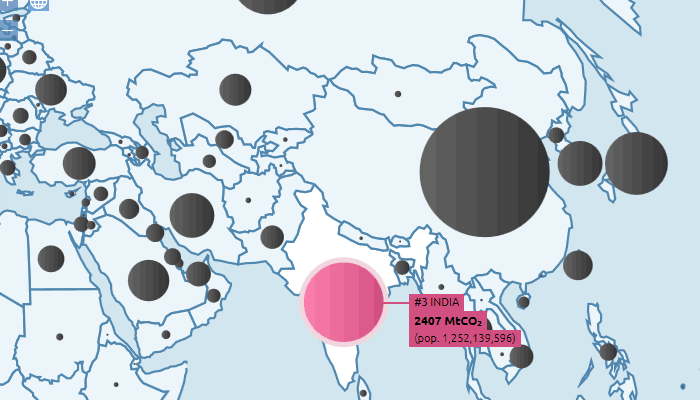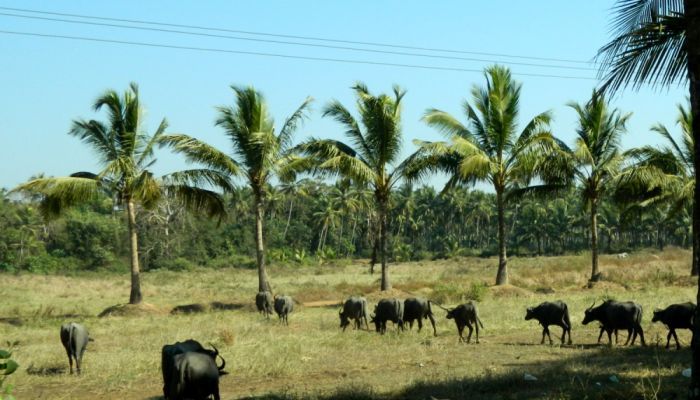
There is a message New Delhi’s top bureaucrats must listen to and understand, for it is they who advise the ministers. The message has to do with climate change and India’s responsibilities, within our country and outside it. This is the substance of the message:
1. The Bharatiya Janata Party-led National Democratic Alliance government must stop treating the factors that contribute to climate change as commodities that can be bartered or traded. This has been the attitude of this government since it was formed in May 2014 – an attitude that says, in sum, ‘we will pursue whatever GDP goals we like and never mind the climate cost’, and that if such a pursuit is not to the liking of the Western industrialised world, India must be compensated.
2. Rising GDP is not the measure of a country and it is not the measure of India and Bharat. The consequences of pursuing rising GDP (which does not mean better overall incomes or better standards of living) have been plain to see for the better part of 25 years since the process of liberalisation began. Some of these consequences are visible in the form of a degraded natural environment, cities choked in pollution, the rapid rise of non-communicable diseases, the economic displacement of large rural populations. All these consequences have dimensions that deepen the impacts of climate change within our country.
3. There are no ‘terms of trade’ concerning climate change and its factors. There is no deal to jockey for in climate negotiations between a narrow and outdated idea of GDP-centred ‘development’ and monetary compensation. The government of India is not a broking agency to bet a carbon-intensive future for India against the willingness of Western countries to pay in order to halt such a future. This is not a carbon casino and the NDA-BJP government must immediately stop behaving as if it is.
The environment minister, Prakash Javadekar, has twice in March 2015 said exactly this: we will go ahead and pollute all we like in the pursuit of our GDP dream – but if you (world) prefer us not to, give us lots of money as compensation. We condemn such an attitude and we condemn such a statement. Javadekar has made such a statement, but we find it deeply worrying that a statement like this may reflect a view within the NDA-BJP government that all levers of governance are in fact monetary ones that can be bet, like commodities can, against political positions at home and abroad. If so, this is a very serious error being made by the central government and its advisers.
Javadekar has most recently made this stand clear in an interview with a foreign news agency. In this interview (which was published on 26 March 2015), Javadekar is reported to have said: “The world has to decide what they want. Every climate action has a cost.” Worse still, Javadekar said India’s government is considering the presentation of a deal – one set of commitments based on internal funding to control emissions, and a second set, with deeper emissions cuts, funded by foreign money.
Earlier in March, during the Fifteenth Session of the African Ministerial Conference on Environment (in Cairo, Egypt), Javadekar had said: “There has to be equitable sharing of the carbon space. The developed world which has occupied large carbon space today must vacate the space to accommodate developing and emerging economies.” He also said: “The right to development has to be respected while collectively moving towards greener growth trajectory.”
Such statements are by themselves alarming. If they also represent a more widespread view within the Indian government that the consequences of the country following a ‘development’ path can be parleyed into large sums of money, then it indicates a much more serious problem. The UNFCCC-led climate change negotiations are infirm, riddled with contradictions, a hotbed of international politics and are manipulated by finance and technology lobbies. It remains on paper an inter-governmental arrangement and it is one that India is a part of and party to. Under such circumstances, our country must do all it can to uphold moral action and thinking that is grounded in social and environmental justice. The so-called Annex 1 countries have all failed to do so, and instead have used the UNFCCC and all its associated mechanisms as tools to further industry and foreign policy interests.
It is not in India’s nature and it is not in India’s character to to the same, but Javadekar’s statement and the government of India’s approach – now made visible by this statement – threatens to place it in the same group of countries. We protest such a misrepresentation of India. According to the available data, India in 2013 emitted 2,407 million tons of CO2 (the third largest emitter behind the USA and China). In our South Asian region, this is 8.9 times the combined emissions of our eight neighbours (Pakistan, 165; Bangladesh, 65; Sri Lanka, 15; Myanmar, 10; Afghanistan, 9.4; Nepal, 4.3; Maldives, 1.3; Bhutan, 0.7). When we speak internationally of being responsible we must first be responsible at home and to our neighbours. Javadekar’s is an irresponsible statement, and is grossly so. Future emissions are not and must never be treated as or suggested as being a futures commodity that can attract a money premium. Nor is it a bargaining chip in a carbon casino world. The government of India must clearly and plainly retract these statements immediately.
Note – according to the UNFCCC documentation, “India communicated that it will endeavour to reduce the emissions intensity of its GDP by 20-25 per cent by 2020 compared with the 2005 level. It added that emissions from the agriculture sector would not form part of the assessment of its emissions intensity.”
“India stated that the proposed domestic actions are voluntary in nature and will not have a legally binding character. It added that these actions will be implemented in accordance with the provisions of relevant national legislation and policies, as well as the principles and provisions of the Convention.”

 What is germane to us is: has the IPCC process and method an Indian outlook that will be of as much utility at home as it has been to the inter-governmental effort? A short answer will be ‘no’ to the first query (because it is about science, evidence and international consensus and not about national priorities) and ‘don’t know’ to the second. There is no reason why a ‘don’t know’ should persist, as the Fifth Assessment process comes to a close, for the size of India’s population and economy, and the likely effects climate change has and is forecast to have on our 35 states and union territories ought to have turned climate change into common currency wherever planning is carried out and implemented.
What is germane to us is: has the IPCC process and method an Indian outlook that will be of as much utility at home as it has been to the inter-governmental effort? A short answer will be ‘no’ to the first query (because it is about science, evidence and international consensus and not about national priorities) and ‘don’t know’ to the second. There is no reason why a ‘don’t know’ should persist, as the Fifth Assessment process comes to a close, for the size of India’s population and economy, and the likely effects climate change has and is forecast to have on our 35 states and union territories ought to have turned climate change into common currency wherever planning is carried out and implemented.